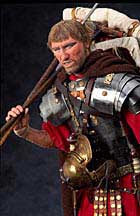"Professor Michael Grant, who died in August, 2004, was a don at Cambridge, Professor of Humanity (Latin) at Edinburgh, and vice-chancellor at the Universities of Khartoum and Queen's, Belfast, but was best known as a prolific populariser of ancient history who published nearly 50 books on the Greeks, Romans and early Christianity.
Grant was always a lucid and erudite writer, who took the view that a study of the classical world was both "infinitely worth studying in its own right, without any consideration of modern analogies" and also that "without Latin, people are handicapped because they do not understand their past, and cannot therefore effectively plan their futures".
This attitude did nothing to impede his range, nor his appeal to the ordinary reader as well as the academic professional. As well as scholarly publications on the coinage of Rome (he was a distinguished numismatist), he produced biographies of Julius Caesar, Nero, Herod, Cleopatra, Jesus, St Peter and St Paul; accounts of the literature, history, art, mythology and social life of Greece and Rome; and found time to examine the Middle Ages and ancient Israel.
Books such as The Twelve Caesars (1975) and Gladiators (which was reissued recently after Ridley Scott's film) sold well in Penguin editions and enabled him to boast of a position as "one of the very few freelances in the field of ancient history" and, for the last 30 years or so, to work from his home in Italy.
The first of his general surveys, Ancient History (1952), and its companion Roman Literature (1954) immediately made clear his gifts of clarity and scholarship. Myths of the Greeks and Romans appeared in 1962, was twice updated, and was followed by Roman Myths. The Climax of Rome (1968) dealt with the neglected period of Rome after the second century AD; The Ancient Historians (1970) summarised the development - the invention, almost - of history; The Army of the Caesars (1974), The Twelve Caesars and The Roman Emperors (1985) covered the rule and supremacy of Rome.
But there was scarcely an aspect of ancient life which did not receive Grant's attention: The History of Rome (1978); The Jews in the Roman World (1973); Art in the Roman Empire (1995); The Classical Greeks (1989); The Hellenistic Greeks (1990) and many more were ground out by his pen." - The News Telegraph
Friday, October 08, 2004
Friday, July 30, 2004
Ralph W. Mathisen
 RALPH W. MATHISEN joined the faculty of the University of Illinois at Urbana-Champaign after 23 years at the University of South Carolina, where he was Louise Fry Scudder Professor of Humanities. He is a specialist in the society, culture, and religion of Late Antiquity.
RALPH W. MATHISEN joined the faculty of the University of Illinois at Urbana-Champaign after 23 years at the University of South Carolina, where he was Louise Fry Scudder Professor of Humanities. He is a specialist in the society, culture, and religion of Late Antiquity.
Professor Mathisen recent works include Barbarian Intellectuals in Late Antiquity, a study of the late Roman comedy The Querolus, and the life and letters of Desiderius of Cahors.
He has authored or edited ten books, including People, Personal Expression, and Social Relations in Late Antiquity, 2 vols. (Univ. of Michigan, 2003); Society and Culture in Late Antique Gaul. Revisiting the Sources (Ashgate, 2001) (with D.R. Shanzer); Law, Society, and Authority in Late Antiquity (Oxford Univ. Press, 2001); and Ruricius of Limoges and Friends: A Collection of Letters from Visigothic Aquitania (Liverpool Univ. Press, 1999), and has published over 60 scholarly articles including Valentinian.
He is Director of the Biographical Database for Late Antiquity Project, and a Fellow of the American Numismatic Society. He has also served in a number of capacities for the Byzantine Studies Conference, the American Philological Ass., the Ass. for History and Computing, the Ass. of Ancient Historians, the Classical Ass. of Midwest and South, the Soc. for Ancient Numismatics, the Society for Late Antiquity, and the U.S. National Committee for Byzantine Studies.
He maintains the Geography of Roman Gaul website: http://www.sc.edu/ltantsoc/geogmain.htm
He received his Ph.D. from the University of Wisconsin in 1979.
Contact information:
RALPH MATHISEN [ruricius@msn.com]
Department of History, University of Illinois
309 Gregory Hall, 810 S Wright ST, MC-466, Urbana IL 61801 USA
Phone: 217-244-2075 FAX: 217-333-2297
Friday, July 23, 2004
Andrew Wallace-Hadrill
 "Andrew Wallace-Hadrill is director of the British School at Rome and Professor of Classics at Reading University. An expert on Pompeii, Professor Wallace-Hadrill was awarded the AIA James R. Wiseman Award in 1995 for his book, Houses and Society in Pompeii and Herculaneum (1994). He has written several other books including, Augustan Rome (1993) and Suetonius: the Scholar and his Caesars (1985)."
"Andrew Wallace-Hadrill is director of the British School at Rome and Professor of Classics at Reading University. An expert on Pompeii, Professor Wallace-Hadrill was awarded the AIA James R. Wiseman Award in 1995 for his book, Houses and Society in Pompeii and Herculaneum (1994). He has written several other books including, Augustan Rome (1993) and Suetonius: the Scholar and his Caesars (1985)."
He is presently director of BSR's Pompeii Project.
"The project aims to take a small slice of the city, a single block of houses or insula, excavated first half a century ago, yet never published, and to see what can be said about it now to cast light on the city, its history and its life. Its three main components are archival research into the original excavation of 1952-3, the artefacts then excavated, recording and analysis of the standing remains, and the excavation of levels below that sealed by the eruption of AD 79."
His work has also served as resource material for such interesting programs as "The Private Lives of Pompeii" produced by Channel 4 and "Roman Empire in the First Century" produced by PBS.
His enthusiasm is so natural and refreshing, its contagious! I even sent an e-mail to The Teaching Company asking them to produce some courses on Rome with Andrew as the professor. I see Andrew produced an excellent article on Pompeii for the BBC website.
Tuesday, July 13, 2004
Kenneth W. Harl
 Kenneth W. Harl
Kenneth W. Harl
"Kenneth W. Harl is Professor of Classical and Byzantine History at Tulane University in New Orleans, where he has been teaching since 1978. He earned his Bachelor's degree from Trinity College and went on to earn his Master's and Ph.D. from Yale University.
Dr. Harl specializes in the Mediterranean civilizations of Greece, Rome, Egypt, and Byzantium. He has published numerous articles and is the author of Civic Coins and Civic Politics in the Roman East, A.D. 180-275 and Coinage in the Roman Economy, 300 B.C. to A.D. 700. He is also a veteran field researcher who has served since 1999 on the Editorial Board of the American Journal of Archaeology."
"Every scholar in the field of Greco-Roman history knows Ken Harl's works on coinage. His ability to explain all manners of social, economic and historic events using coins is a terrific tool to teach students," says Jason Sanchez, a student who accompanied Dr. Harl on one of his guided trips to Turkey.
One of his favorite personnages of Roman history is Julia Domna, the empress of the Serverus Roman Empire, circa 193 C.E.
His latest course for The Teaching Company is Rome and the Barbarians. Other courses he has produced for The Teaching Company is Great Civilizations of Asia Minor and The World of Byzantium.
See also: Head and Tales
Wednesday, June 23, 2004
J. Rufus Fears
 The establishment of a shrine to Mens was authorized at the behest of the Sibylline Books following the disastrous Roman defeat at Lake Trasimene in 217 BC. The action was taken at the instruction of Q. Fabius Maximus, who was dictator and augur and would become pontifex in 216. The introduction of the worship of Mens reflects the employment of cultic innovations to justify the policy of Fabius and his supporters." - J. Rufus Fears, The Virtue of Mens: Roman Cult and Greek Thought
The establishment of a shrine to Mens was authorized at the behest of the Sibylline Books following the disastrous Roman defeat at Lake Trasimene in 217 BC. The action was taken at the instruction of Q. Fabius Maximus, who was dictator and augur and would become pontifex in 216. The introduction of the worship of Mens reflects the employment of cultic innovations to justify the policy of Fabius and his supporters." - J. Rufus Fears, The Virtue of Mens: Roman Cult and Greek Thought
I had the pleasure of learning from Dr. Fears vision of Greek and Roman Society when I took two audio courses, Famous Greeks and Famous Romans, from The Teaching Company. A 15-time award winner for outstanding teaching including "Professor of the Year" in his present position at the University of Oklahoma, Professor Fears incisive anecdotes brings the ancient societies to life and reflects his enthusiasm for classical studies.
Professor Fears has been instrumental in organizing the Societas Colloquium, an international Symposium on Roman Imperial Ideology. He has served as president of the Vergillian Society, a group of scholars who hold symposia "focusing upon the archaeology, ancient history, philology, linguistics, iconography, and ritual activities at Italian cult centers, and the degree to which these cults were retained, modified, or replaced under foreign influences."
He has also authored The Cult of Virtues and Roman Imperial Ideology.
His e-mail address is listed as: J.R.Fears-1@ou.edu
Subscribe to:
Comments (Atom)




